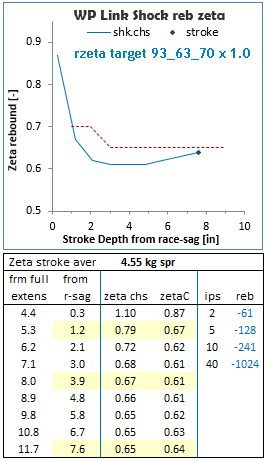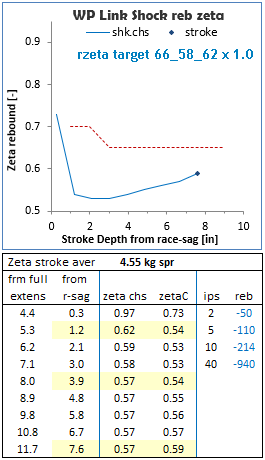| We are comparing Valving Logic r-zeta with restackor zetaC. Valving Logic zeta doesn't take into account the full lev ratio as does zetaC. |
WE CHANGED THIS TO 05A and 05B WE CAN DELETE THIS LATER |
| The restackor zetaC plot was used to design all new targets with r-zeta ranging from .59 to .70 at 40ips. |
| Tips on matching r-zeta to ro wogas on press target tab. |
| Assume reb TO BE LINEAR*, match reb force at 40ips, then see where 2 & 5ips falls. [same as c force] |
| The new baseline targets have 55 lbs fixed reb force at 2ips. As per below, we are thinking 52-55 lbs min reb force is needed at 2ips. |
| Use zeta correction factor to adjust the targets up or down as needed. See below for specific examples. |
| * As per Sh Dyno.press targ > quickLooksh_dynoshock_reb_wsort.php, 1 stage reb is fairly linear, 2 stage has approx 10 lb dip at 5-10ips. |
| r-zeta target overview |
| We have designed 12 new linear targets and 12 new nonlinear (dip) targets. |
| Think of it asthid. reb at 2-3ips provides bike stabalitly at race sag. When the rear extends from a bump and puts the chassis high in the stroke (around race sag) you want it to be fluid and stable but not busy. When the rear is accelerating accross chop you want reb fast enough for the wheel to respond. Slow reb in this area can keep the wheel from hooking up and can feel harsh. When the rear is fully compressed you want the wheel to extend at just the right rate. Proportionally this might be a bit slower than reb at 2-4 inch stroke depth from race sag. |
| SWe arranged the reb targests on this page from slowest to fasted. o the reb targets are arranged from slowest to fastest (at the top). |
| we could keep going, but we wanted this down so we would remember the direction we wanted to go laying out the info. |
| Finish later |
Rebound is normally linear (if we don't want to say normally, come up with different word) and produces even/linear r-zeta values. For example, r-zeta throught the reb stroke might be .67. The new reb targets are on a curve. This gives faster reb at 5-10ips resulting in quicker swheel response on chop. The zeta curve may look like this. [at 2-5-40ips] r-zeta .68 - .59 - .67. Where linear reboud reta might look like this. at 2-5-40ips. .70 - .70 - .70. |
|
| 51 - 887 | 68_62_59 x 1.0 |
| 51 - 940 | 65_64_62 x 1.0 |
| 51 - 997 | 68_67_66 x 1.0 |
| 51 - 1054 | 68_69_70 x 1.0 |
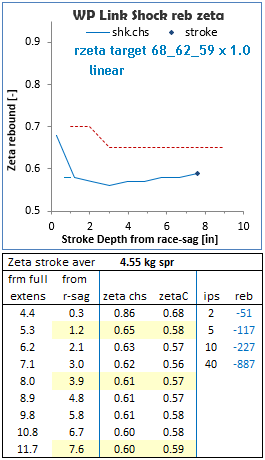
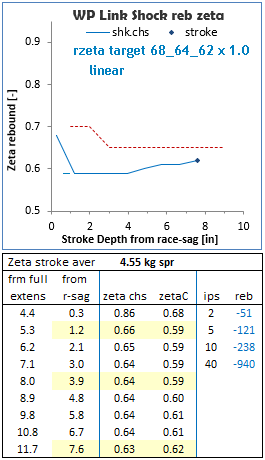
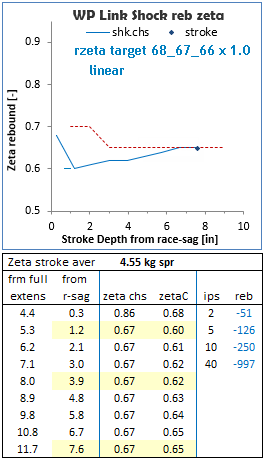
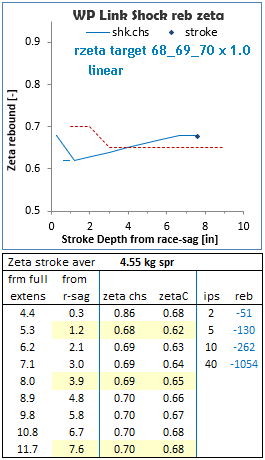
| 55 - 887 | 73_64_59 x 1.0 |
| 55 - 940 | 73_66_62 x 1.0 |
| 55 - 997 | 73_69_66 x 1.0 |
| 55 - 1054 | 73_71_70 x 1.0 |
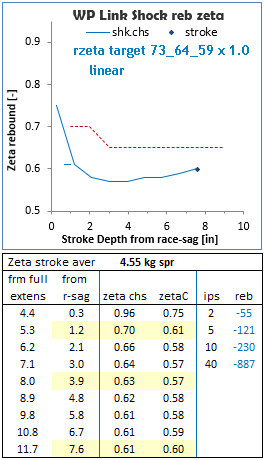
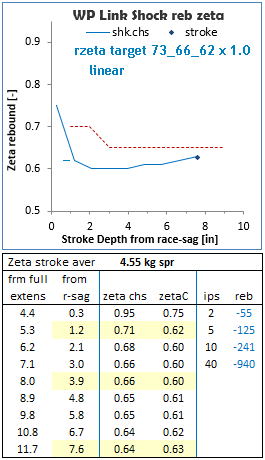
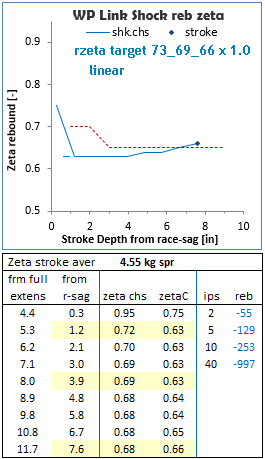
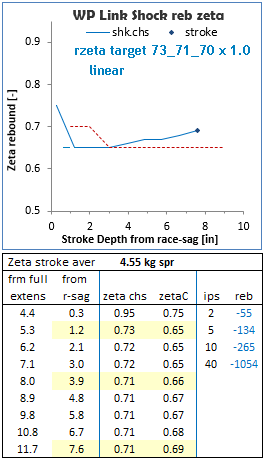
| 59 - 887 | 78_66_59 x 1.0 |
| 59 - 940 | 78_68_62 x 1.0 |
| 59 - 997 | 78_71_66 x 1.0 |
| 59 - 1054 | 78_73_70 x 1.0 |
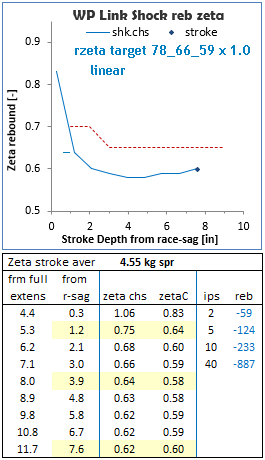
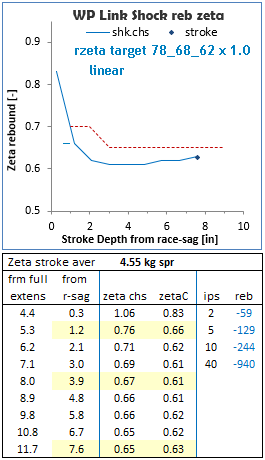
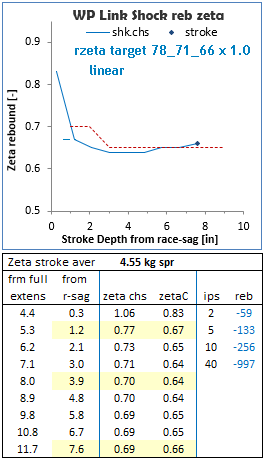
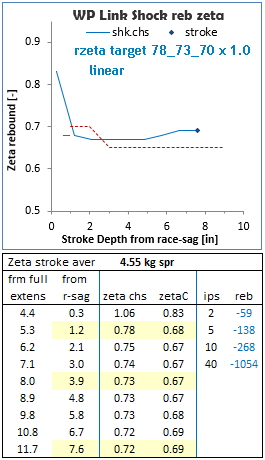
| 52 - 1054 | na |
| 52 - 997 | 74_71_70 x .93 |
| 52 - 940 | 73_69_66 x .94 |
| 52 - 887 | 73_66_62 x .94 |
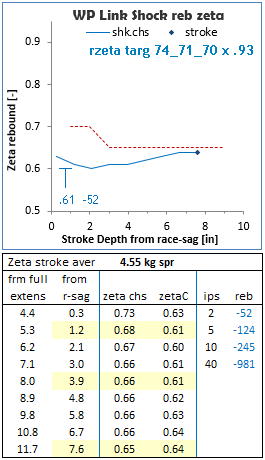
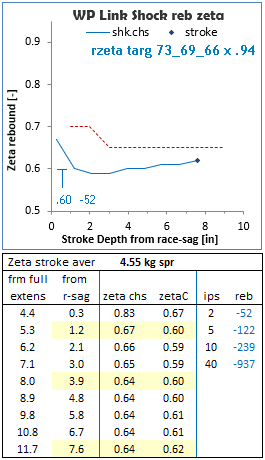
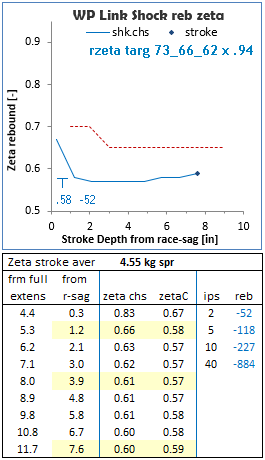
| 49 - 1054 | na |
| 49 - 997 | na |
| 49 - 940 | 74_71_70 x .88 |
| 49 - 887 | 78_72_70 x .83 |
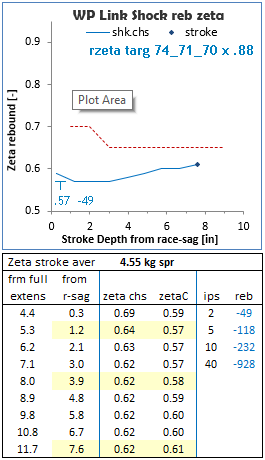
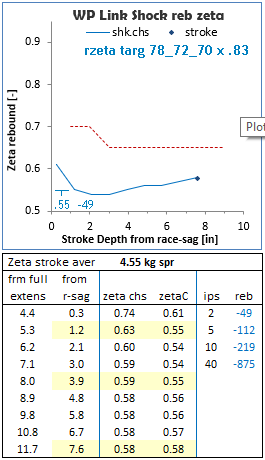
- We're creating a new r-zeta target based on slightly s faster reb at 2-3" stroke from race sag so the wheel can can hook up and respond to chop. Then Reb from full extension slows back down to 'normal' with r-zeta somewhere around .65 +/- [yet to be determined]
| kk49 - 1054 | na |
| 4kk9 - 997 | na |
| ???49 - 940 | 93_63_70 x 1.0 |
| we may not use this | |
| 50 - 940 | 66_58_62 x 1.0 |
